Northern Ireland’s DUP meet with equal marriage campaigners – but will continue to block equality
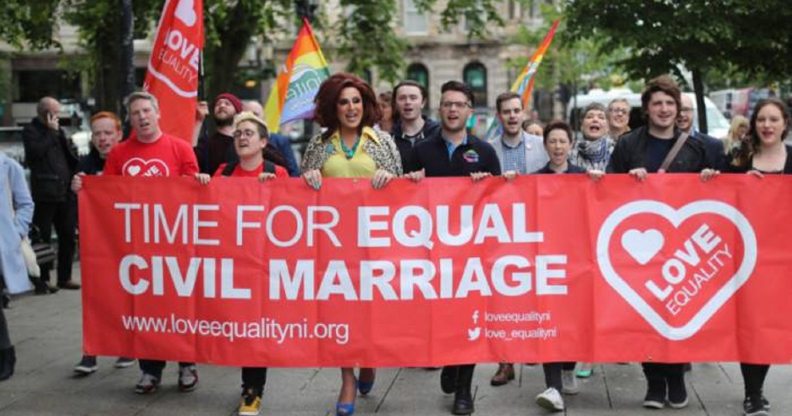
Northern Ireland’s Democratic Unionist Party have met with equal marriage campaigners – as progress on the issue remains stalled in the region.
Northern Ireland is the only part of the UK that still bans same-sex couples from marrying, as the Democratic Unionist Party has blocked democratic votes on the issue.
Hopes were raised today that the party could change its stance, after agreeing to meet with equal marriage campaigners in the region.
But the campaigners left the meeting with the DUP’s Edwin Poots disappointed – as he failed to shift even slightly on the issue.
Cara McCann of the Love Equality campaign, said: “We welcome the meeting with the DUP today, but are extremely disappointed with the outcome. Sadly, the DUP remains opposed to civil marriage equality for Northern Ireland in the face of overwhelming support among the public and within the Assembly.
“No commitment was given by the party to end their use of the petition of concern, and if this remains their position, it is difficult to see how any new Executive could be considered a government for all the people of Northern Ireland.
“We will continue to call on the DUP to listen to the clear majority of people, including very many of their own voters, who support equal marriage. And we call on other parties to ensure that any new Stormont government can deliver marriage equality. That means either a new Executive will introduce marriage equality legislation, or that Executive parties deliver meaningful reform of the petition of concern to remove it as a veto on equality.
“Failing that, we will shift our focus to Westminster and ask the UK government to ensure equality for all citizens, rather than uphold discriminatory laws in Northern Ireland. We look forward to meeting with the Secretary of State Karen Bradley in the coming weeks.”
Explainer: Why doesn’t Northern Ireland have equal marriage yet?
Today’s meeting was the first time that the DUP has agreed to meet the Love Equality campaign.
Northern Ireland is currently without a government due to the collapse of power-sharing between the DUP and Sinn Fein.
Sinn Fein have demanded a settlement on equal marriage as part of any power-sharing deal, while hardliners in the DUP have threatened to revolt if the party makes any concession on the issue.
In the previous assembly, the DUP used a procedure known as a ‘petition of concern’ to override democratic votes in favour of equal marriage.
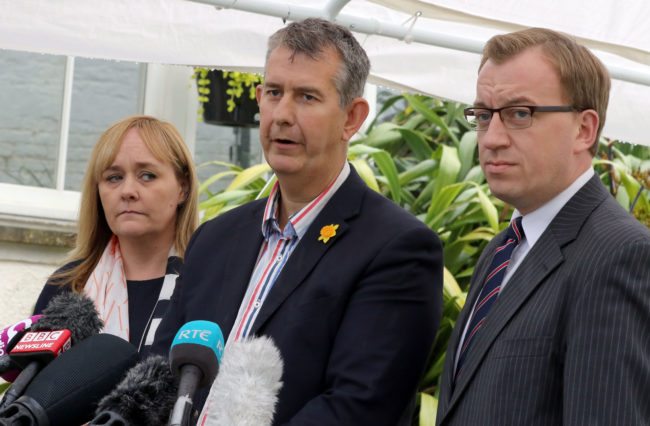
The DUP’s Edwin Poots with colleagues (Photo by PAUL FAITH/AFP/Getty Images)
Poots, who led the DUP delegation, is a strong opponent of equality.
He has previously faced formal complaints after suggesting that PinkNews supports paedophilia. When serving as country’s Health Minister in 2015, he overruled expert advice and keep a permanent blanket ban on blood donation by gay men – even as the regulations were relaxed across the rest of the UK. He then faced a lengthy court battle over allegations that he had been biased in his actions.
Love Equality also plans to meet with Karen Bradley, the UK government’s Secretary of State for Northern Ireland.
Responding to a question from Scottish Labour MP Ged Killen, Ms Bradley said: “The Secretary of State for Northern Ireland intends to meet Love Equality in the coming weeks, subject to diary commitments.”
Love Equality added: “We look forward to meeting NI Secretary Karen Bradley to discuss #MarriageEquality legislation via Westminster in event of continued Stormont failure.”
Ms Bradley previously said that she will not “impose” same-sex marriage on the region.
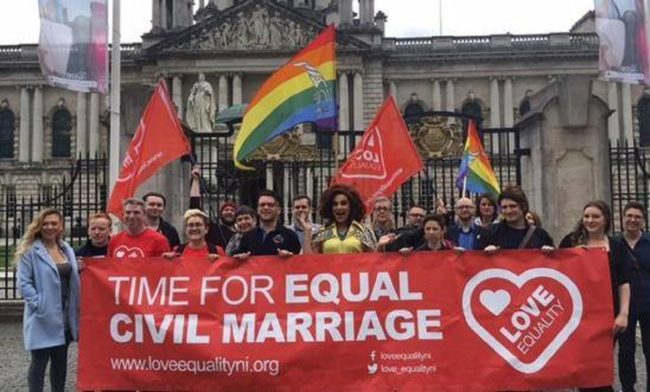
She said: “I am a supporter of same-sex marriage, I voted for it, but that is a matter for the people of Northern Ireland and that’s a decision that needs to be taken by the people elected by the people of Northern Ireland.
“I am not here to impose any of those things, I am here to help facilitate a government of the people of Northern Ireland, the representatives of the people of Northern Ireland delivering for the people of Northern Ireland.”
But in a sign that the government could be shifting its stance, the Northern Ireland Office recently started recruiting for an official whose brief includes “marriage equality” and human rights.
Director of The Rainbow Project, John O’Doherty said: “We welcome this appointment of a senior civil servant within the Northern Ireland Office, apparently with a remit to help bring marriage equality to Northern Ireland in the absence of devolved government.
“The Secretary of State should now make clear her intentions to the Northern Ireland public, including the many same-sex couples trying to plan their future.
“The Love Equality campaign looks forward to an early meeting with the Secretary of State to discuss how best to bring Northern Ireland into line with the other jurisdictions in these islands with the legal recognition of the right of same-sex couples to marry.
“Ultimately, marriage equality must and will become a reality in Northern Ireland. In the absence of an Assembly and Executive, the responsibility for undoing marriage discrimination in Northern Ireland falls to the Secretary of State for Northern Ireland. We hope she will choose to be an ally to LGBT people, their friends, family members and the overwhelming majority of people here who wish to live in an equal society.”
If no action is taken it is likely gay couples will have to wait many more years for the right to marry in the region.
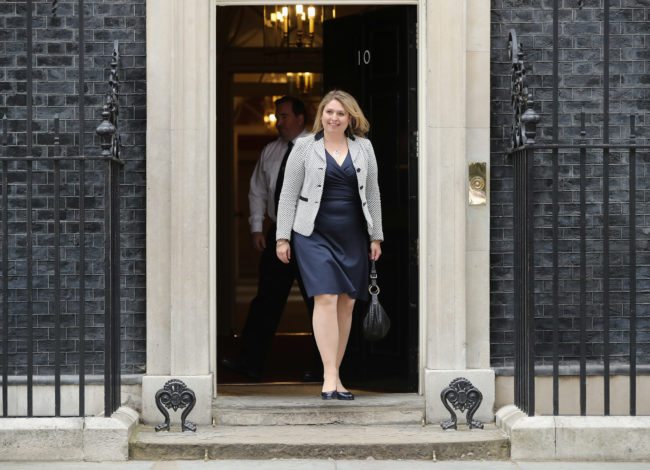
Karen Bradley leaves 10 Downing Street (Photo by Dan Kitwood/Getty Images)
Michelle O’Neill, Sinn Fein’s leader in Northern Ireland, recently warned that gay people could not be treated as “second-class citizens”.
In a New Year’s address, she said: “The past 12 months has been an extraordinary time politically.
“We have witnessed incredible political developments, suffered the loss of a political giant but also the reawakening of the demand for fairness and equality at the heart of our political process.
“And as we look forward to 2018, Sinn Féin is determined and optimistic that we will realise that demand.”
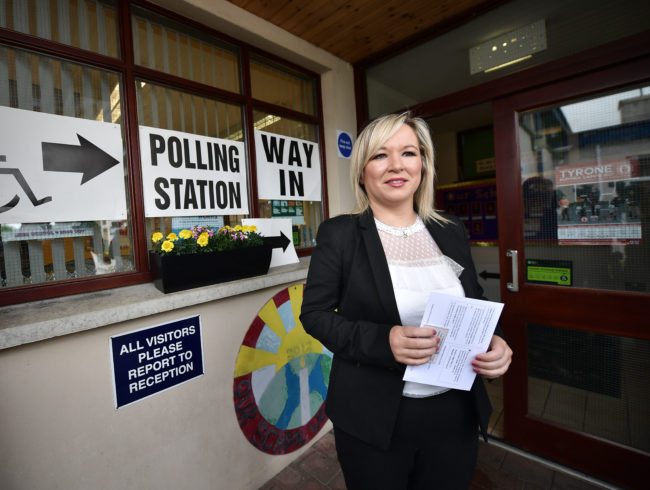
She added: “I am optimistic because I see the transformation that has taken place in this society since the people voted for the Good Friday Agreement 20 years ago.
“I see the young people who will not tolerate their peers being treated as second-class citizens because of their sexuality.
“I see civic society standing up to be counted and demanding their rights and entitlements are protected and enshrined on the same basis as they are elsewhere on these islands.
“They will not accept the denial of language rights, of marriage equality and the right to coroner’s inquests because the DUP dictate it.
“People across Ireland have been shaken by the recklessness of the DUP-Tory Brexit agenda and the immense harm it will cause to communities and the economy throughout the island.
“That is not the future they want for their children and grandchildren.”
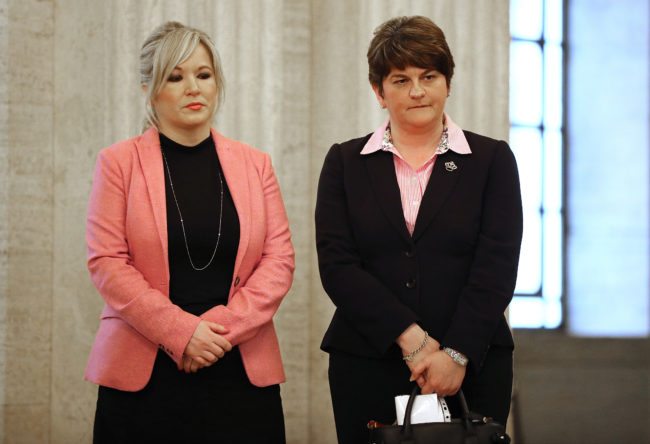
Sinn Fein leader Michelle O’Neill (L) and (DUP) Democratic Union Party Leader Arlene Foster (Photo by Dan Kitwood/Getty Images)
She added: “Fifty years on from the Civil Rights campaign in 1968, the North is a very different place. A place where the denial of rights, equality and respect will no longer be accepted.
“A majority want the restoration of genuine power-sharing.
“A majority want rights and equality.
“A majority reject the frustration of their achievement; the erection of a barrier to this by a minority who have a different political opinion or religious belief.”
Of a potential deal to restore power-sharing, she said: “I believe that can happen early in the New Year but only if the institutions represent genuine and equal partnership Government for all our people.
“That will require the British government and the DUP accepting the political and democratic reality which has already been made abundantly clear by the electorate.”
LGBT activists in the region have previously called for the UK government to directly intervene to secure equal marriage due to the collapse of power-sharing.
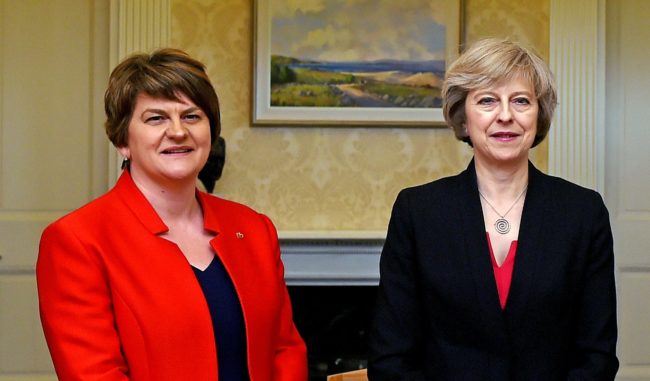
Arlene Foster with British Prime Minister, Theresa May
Director of The Rainbow Project John O’Doherty said: “Of course, we would prefer that the Northern Ireland Assembly were in a position to grant these rights; the Assembly is not currently functioning.
“It is, therefore, the responsibility of Theresa May’s government to make the necessary amendments to the marriage legislation to make it applicable in Northern Ireland.
“The eyes of LGBT people around the world will now be on Theresa May. She says that she has changed her mind on LGBT equality over her years in Parliament. Now is her chance to prove it.”
Clare Moore of Love Equality concurred: “During this period of political instability it is now imperative that the Westminster government takes immediate action to ensure that the rights of LGBT people in United Kingdom are available for all UK citizens.”
Such a move would likely be opposed by both the DUP, who oppose equality, and Sinn Fein, who oppose UK interventions in Northern Ireland.
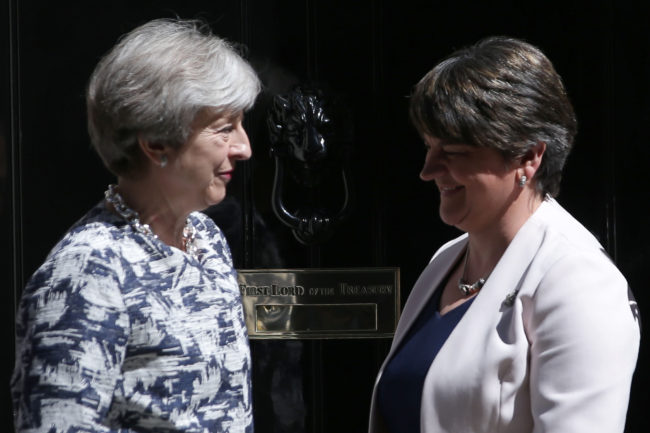
Theresa May and Arlene Foster (Getty)
However, there were hints last month that the UK Labour Party may support proposals to break the impasse.
According to The Times, Jeremy Corbyn’s Shadow Northern Ireland Secretary Owen Smith is in favour putting equal marriage and abortion rights to a referendum if power-sharing is not restored.
Polling suggests that there is overwhelming support for same-sex marriage in the region, and when a referendum was held in the Republican of Ireland in 2015, 62% backed the change.
A referendum could be a way to allow equal marriage in Northern Ireland to go ahead with popular support, despite the lack of power-sharing.
UK Prime Minister Theresa May recently expressed her personal support for same-sex marriage, in an exclusive column for PinkNews.
Writing for PinkNews, Mrs May affirmed: “I want all British citizens to enjoy the fullest freedoms and protections. That includes equal marriage – because marriage should be for everyone, regardless of their sexuality.
“And while that is a matter for the devolved government of Northern Ireland, I will continue to make my position clear – that LGBT+ people in Northern Ireland should have the same rights as people across the rest of the UK.”

